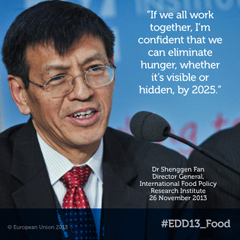This week, European development practitioners, partners, and stakeholders worldwide have gathered at the 8th annual European Development Days in Brussels with an eye toward improving development coordination and aid effectiveness in 2015 and beyond. Specifically, their discussions will focus on four prevailing themes: scaling up work toward meeting basic living standards; upholding human rights and ensuring equity and justice; promoting drivers for inclusive and sustainable growth; and toward a new partnership for development.
IFPRI’s Director General Shenggen Fan participated in two roundtable events as part of the forum. In the first event, “Resilience-building for Improved Food Security and Nutrition,” which featured a distinguished panel of presenters, Fan highlighted the importance of building the resilience of smallholders. He said the world is struggling with overlapping and increasingly severe political, economic, public health, and environmental shocks, which often impact developing countries and vulnerable populations the most. Smallholder farmers have an important role to play in building resilience against these threats, said Fan.
Emphasizing the heterogeneity of smallholders as a group, he recommended a varied approach to help households move out of poverty, malnutrition, and vulnerability, explaining that some farmers could profit from scaling up commercial activities in the agricultural sector while others could benefit the most by moving out of the sector and finding work in other areas with greater earning potential and less exposure to shocks. Farmers who are currently thriving in commercial agriculture should be supported through improved access to capital and risk-reducing tools.
Fan suggested three means of amplifying smallholder resilience:
* Promoting social safety nets;
* Increasing smallholder-friendly financial tools and investments; and
* Integrating smallholders into nutrition-focused value chains.
The second panel, “Food Security and Food Justice: Building Blocks for a Just and Sustainable Global Food System” addressed how to adjust resource allocation and current agricultural practices in order to feed the world, in the context of a changing climate, land and water scarcity, competing demands on the food supply, and beyond. Fan spoke about the pathway to sustainably eliminating hunger by 2025.
He suggested that the way forward lies in following success stories from other regions. For example, in China, Ghana, and Vietnam, gains were driven by an agricultural growth-led strategy, while in Brazil, targeted social protection and nutrition interventions have proven successful. Thailand chose to follow a combination of these two approaches.
The international community can usher in an era of food security and improved nutrition through better coordination and innovative, cost- effective approaches to tackling hunger. Fan highlighted four key actions for stakeholders to pursue:
* Good metrics to monitor progress toward food and nutrition security;
* Country-led approaches;
* Evidence-based policies; and
* Harnessing new actors, such as the private sector and emerging economies.







